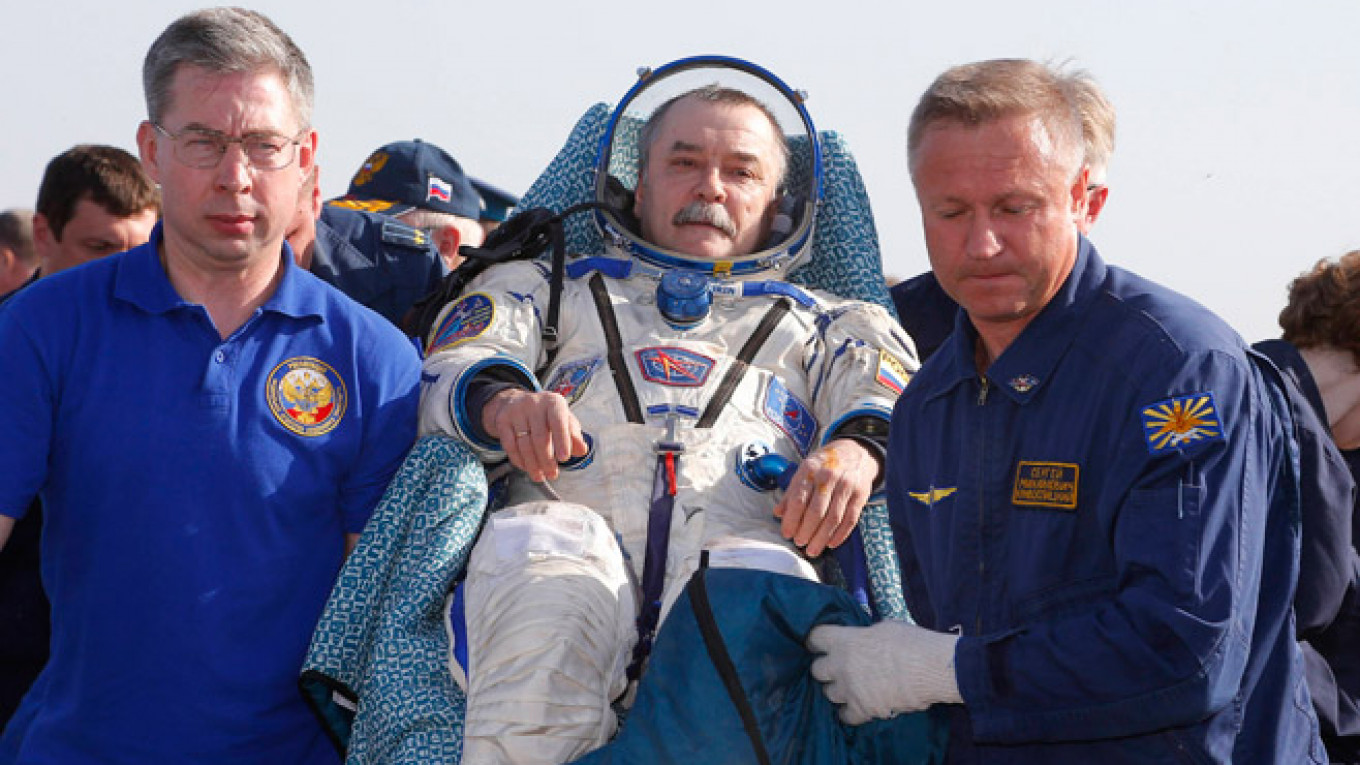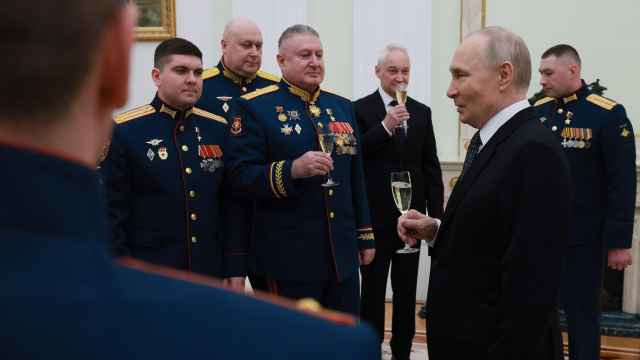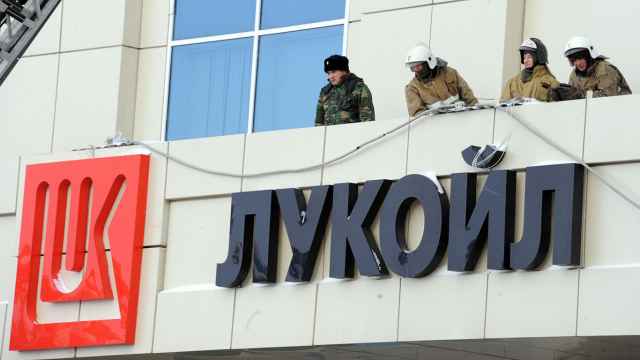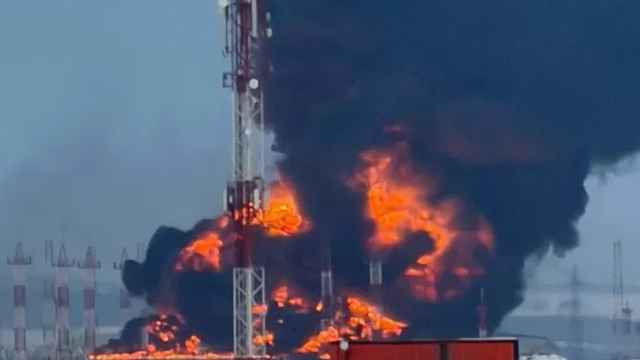Special report for MT
With a summit meeting between the Russian and Chinese presidents due to begin Tuesday, Deputy Prime Minister Dmitri Rogozin has followed last week's rhetorical bombshell — that Russia was not interested in extending operation of the International Space Station, or ISS, beyond 2020 — by trumpeting a future of increased cooperation with the emerging Chinese National Space Agency.
Meeting with his Chinese counterpart, Deputy Prime Minister Wang Yang, in Beijing on Monday, Rogozin announced on Twitter that he had signed "a protocol on establishing a control group for the implementation of eight strategic projects." In a later Facebook post, he said "cooperation in space and in the market for space navigation" were among the projects.
Rogozin and Wang agreed to hold a meeting between the heads of their respective agencies "in the near future," so that Beijing and Moscow could sow the seeds of a potential space partnership.
Federal Space Agency chief Oleg Ostapanko wants to allow "Chinese colleagues participate in some of the most interesting projects that can replace the ISS," Rogozin said, adding that they would also discuss "projects such as cooperation in the field of rocket engine development," and cooperation in the growing market of space applications services — which primarily applies to the development of the Chinese Beidou satellite navigation system and Russia's Glonass navigation system, both rivals to the U.S.' GPS.
However, analysts doubted Russia's ability to be a reliable and fruitful partner to China beyond 2020, as Russian capabilities in space have drastically withered in the 20 years since the collapse of the Soviet Union, and the Russian space program lacks clear direction or goals.
Bleak Prospects
"The purpose of any cooperation between states in space is to minimize the costs of complex projects and the development of science and technology," Pavel Luzin, a researcher at the Russian Academy of Science's Institute for World Economy and International Relations told the Moscow Times Monday.
By this measure, Luzin sees little point in a Russia-China space partnership. China needs Russia only for "technologies they have not yet developed," and Russia lacks both a long-term vision for its space program and an industry capable of supporting it.
Aside from the failed Phobos-Grunt scientific mission to one of the Martian moons in 2011, the history of Russian-Chinese cooperation in space amounts to little more than technology transfer.
"In particular, the Chinese manned space program — spacecraft, spacesuits, etc. — is largely built on borrowed Soviet and Russian technology," Luzin said, and "such cooperation should not be exaggerated."
China does not need Russia as a genuine partner in space, Luzin thinks. Having been barred by the U.S. from the International Space Station program — a $100 billion international scientific project involving 15 nations — China has unilaterally pursued an ambitious exploration program in recent years, convinced that a great power must have a commanding presence in space.
James Oberg, an expert on the Russian space program and NASA mission control veteran, rated China's progress highly. "China's program has moved from methodical recapitulation of Western stages into some breathtakingly innovative new mission designs, such as its asteroid fly-by mission ... [which] shows Beijing's intention to pioneer space exploration in the decade ahead."
In 2003, China became the third nation to independently put a man in space, and in 2011 it deployed its first small, single-module space station — Tiangong. By 2023 it hopes to build a multi-module space station, resembling Russia's Mir space station. China may therefore be interested in using Russia to master the required technology and techniques, but beyond that there is little reason for China to be interested in Russia as a partner, according to Luzin.
Aside from expertise in space station construction, Russia could share expertise on reusable spacecraft and rocket engine technology. Engines are one of Russia's greatest contribution to Western space efforts — U.S. spacecraft manufacturers have been big buyers of Russia's powerful RD-180 and NK-33 engines.
"But here too, cooperation cannot be long term. It will end after the transfer of technology has been completed," Luzin said.
The Price of a Pivot
Were Russia to turn its back on its U.S. partners in space to focus on cooperation with China, it would lose more than it would gain: "It is obvious that without cooperation with the West that Russia would lose in the competition in science and technology," Luzin said.
With a history of cooperation dating back to 1975, the U.S. and Russia have cultivated an intimate partnership in the field of space exploration over the 20 years since the fall of the Soviet Union, a relationship solidified on the ISS joint project. Representatives of both countries' space agencies are present in Mission Control Moscow and Houston at all times to support each other's operations on the ISS, and scientific collaborations are constant.
This relationship has given Moscow a reputation as a reliable and generous partner in large-scale technology projects — Russia has been giving U.S. astronauts rides to the ISS aboard its Soyuz launch vehicle following the retirement of the U.S. Space Shuttle fleet — as well as insight in to advanced Western space technology and science.
"Throwing both away for spite is more than foolish, it is reverting to a doomed path of space development that will harm Russia most, since Russia remains critically dependent on Western technology imports," NASA's Oberg said.
Luzin hit back at that notion — the scientific value of Russia's participation in the ISS program is marginal, he said, and presents little value beyond 2020, since "Russia is not doing anything new on ISS compared to what it was doing aboard the Mir space station between 1986 and 2001."
To Boldly Go
Currently, the Russian space program is entirely tied to the ISS, which Luzin said "receives the lion's share of spending on civil space exploration." This is a product of its integration with the Western aerospace community through the ISS program, which was consciously fostered to address the problem of modernizing the Soviet-era space industry and its integration into the global economy.
Unfortunately, none of these problems were appropriately addressed, said Luzin, and any discussion of Russia's future in space beyond 2020 "rests on the need for deep structural reforms, which not only Rogozin is unprepared for, but the entire Putin team. Moreover, there is no understanding in government of where and how we can and must develop in space."
Oberg was blunt — Russia's main gain in courting Chinese space cooperation is in "fanning nostalgia for obsolete anti-U.S. alliances," he said.
See also:
Russian Space Program Gets $52Bln Boost
Russia Retaliates Against U.S. Space Program in Response to Sanctions
Russian Space Agency Plans China Shift Amid Sanction Fears
Contact the author at [email protected]
A Message from The Moscow Times:
Dear readers,
We are facing unprecedented challenges. Russia's Prosecutor General's Office has designated The Moscow Times as an "undesirable" organization, criminalizing our work and putting our staff at risk of prosecution. This follows our earlier unjust labeling as a "foreign agent."
These actions are direct attempts to silence independent journalism in Russia. The authorities claim our work "discredits the decisions of the Russian leadership." We see things differently: we strive to provide accurate, unbiased reporting on Russia.
We, the journalists of The Moscow Times, refuse to be silenced. But to continue our work, we need your help.
Your support, no matter how small, makes a world of difference. If you can, please support us monthly starting from just $2. It's quick to set up, and every contribution makes a significant impact.
By supporting The Moscow Times, you're defending open, independent journalism in the face of repression. Thank you for standing with us.
Remind me later.






